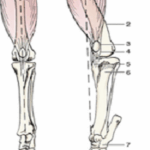 This is one of the toughest articles I’ve written, and very personal. On Saturday we had to say goodbye to Marvin, our family dog for the last 13 years. We got Marvin as a rescue case when he was around 12 months old, when we didn’t know if he would survive the severe neglect he had experienced. With time and a lot of care he became a great family dog, and has been greatly loved by my wife and three young boys.
This is one of the toughest articles I’ve written, and very personal. On Saturday we had to say goodbye to Marvin, our family dog for the last 13 years. We got Marvin as a rescue case when he was around 12 months old, when we didn’t know if he would survive the severe neglect he had experienced. With time and a lot of care he became a great family dog, and has been greatly loved by my wife and three young boys.
As a vet, I experience the death or euthanasia of pets on a nearly daily basis. But it doesn’t prepare you fully for your own pet. Preparing your kids for the death of a pet is also something that I wasn’t fully equipped for. After all, how do you explain quality of life to a 6-year-old? How do you explain what happens to the body afterward? When he’s “gone”, where did he go?
I am often asked in clinic how we talk to the kids about euthanasia and death. As I’m not an expert on kids, I’ve turned to the expert advice of Dr Billy Garvey. There is a great podcast on the topic available at https://www.popcultureparenting.com/.
Some of the top tips from Dr Billy include:
- Grief is a natural response following the loss of someone or something we valued. All of us go through this process differently and there is no correct way to grieve. Let your kids see you grieve – they need to know that it’s OK to show these emotions and see how you cope with them. Grief isn’t something that should be hidden away.
- How we grieve can also change with time. Anger, depression, acceptance, denial, and bargaining, are all common responses to significant loss and often we move from one to another with time. There is not set order to how we grieve. Be there to support your kids at each of these steps.
- Children often begin to learn about death in early childhood (preschool years). Early aspects include that is it inevitable (all living things will eventually die); it is universal (it will happen to everything that is alive); it is irreversible (nothing can come back to life). Talk to the kids at their level, and at their point of development. As parents, we can be prone to either under-explaining or over-explaining. Talk to the kids about what is happening “now” (you don’t always need to explain what’s coming next if they’re not ready for it), and be prepared to answer more questions as they develop or process things. Talking about death is unlikely to be a one-off, done-and-dusted discussion, so answer their questions honestly as they come up.
- How we learn about death and how to grieve is influenced by our family, friends and the culture that surrounds us. It is important that we are responsive to children when they ask us about death or are experiencing grief. There are no perfect answers but being gentle, honest and patient helps children learn how to cope following loss. Don’t tell the kids “the dog is off to the farm”, as they will eventually realise this was a lie and this can damage their trust and development. Learning to grieve is an important skill, so help them develop it. If you’re not religious, don’t tell the kids “they’ve gone to heaven” – instead consider telling them that they now exist through you and your memories, and that by telling stories about them and remembering them you can keep something special about them in your heart.
- William Worden approaches grief counselling by identifying four tasks which a person works through. This can be helpful when dealing with loss or guiding others through the mourning process They are
* Recognize and accept the loss. Being honest with your kids about what is happening is essential for this.
* Process the pain of grief. Be there to support your kids. Answer their questions honestly and openly. Let them see you grieve so they know that it’s OK.
* Adjust to a world without the deceased. Give them time to adjust. Don’t rush out to buy a new puppy to “replace” the last dog as they need to complete this process without the old dog being “replaced”. As hard as it is, the death of a pet can be a valuable learning experience in preparation for the loss of a family member, so getting through all these stages is essential.
* Find a way to remember the deceased while embarking on the rest of one’s journey through life. Let the child determine how they want to remember the pet – they could plant a tree in their memory, have a special place that reminds them of that pet, or even have certain animals as a symbol of that pet. The important thing here is to let the child choose the way.
- Finally, grief can be tough for all of us and as adults supporting children we can not be expected to handle it perfectly. It can be a time to role model seeking help from others, either our loved ones or professionals, when we find it too much to handle alone.



